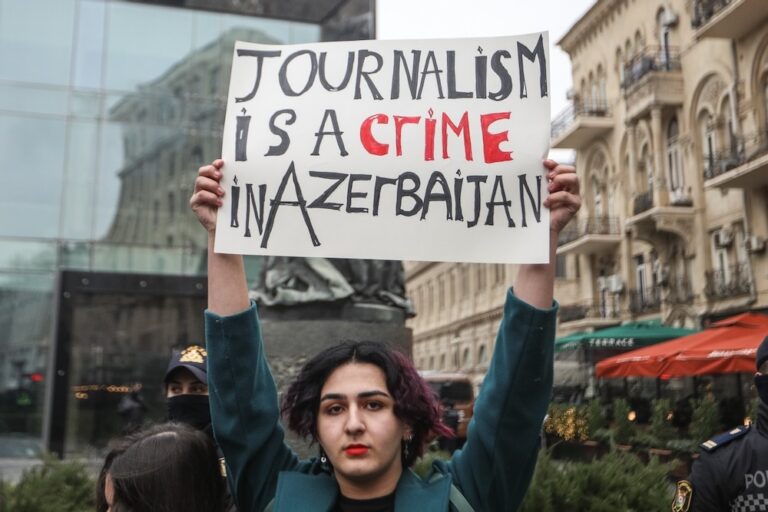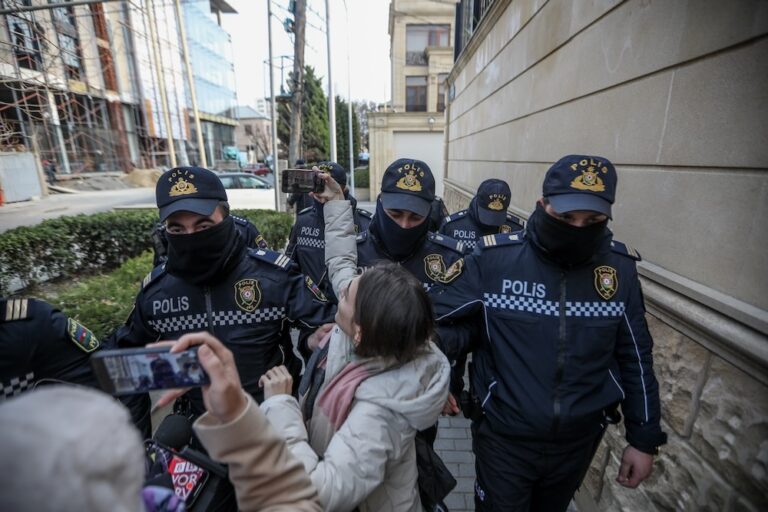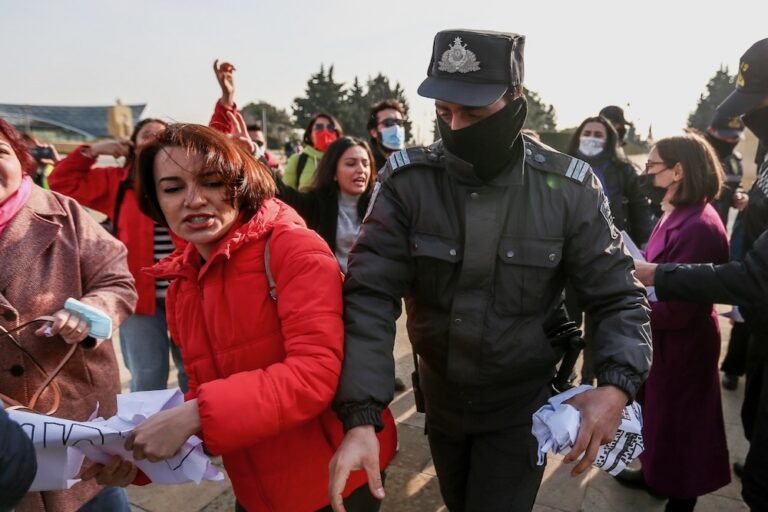HRW presents a Q&A focusing on the human rights implications of COP29 and the human rights concerns associated with holding the conference in a repressive state that relies heavily on fossil fuels.
This statement was originally published on hrw.org on 24 September 2024.
COP29, the 29th annual United Nations Climate Change Conference, will bring together states that are party to the UN Framework Convention on Climate Change as well as thousands of experts, journalists, climate activists, and representatives from businesses and nongovernmental organizations. The conference will take place from November 11 to 22, 2024, in Baku, Azerbaijan.
The conference is being held against the backdrop of Azerbaijan’s dire human rights record. It is important to include extensive civil society participation and open debate, free of fear of retaliation, to hold governments to their commitments to confront climate change and to ensure satisfactory outcomes from the conference. However, the Azerbaijani government’s hostility toward independent civic activism raises concerns about whether members of independent civil society, activists, human rights defenders, and journalists will be able to participate meaningfully at COP29. The following are questions and answers addressing the human rights implications of COP29 and the human rights concerns associated with the conference being held in a country with a history of repression that relies heavily on fossil fuels that contribute to climate change.
-
-
- Why is the climate crisis also a human rights crisis?
- What is at stake for human rights at COP29?
- How are Azerbaijan’s plans to expand fossil fuel production incompatible with Paris Agreement goals?
- Why is a human rights lens essential to determining how to finance efforts to address climate change at COP29?
- What are the human rights concerns about Azerbaijan hosting COP29?
- What is the impact of the human rights crisis in Azerbaijan on environmental groups?
- Why is meaningful participation of civil society and Indigenous peoples essential to a successful COP29 outcome?
- Have previous climate summits restricted participation of civil society?
- What should the Azerbaijani government do to enable full and meaningful participation in COP29?
- What should states that are party to the UN Framework do to press Azerbaijan on ending human rights violations?
- What is the responsibility of the UN Framework Secretariat to uphold human rights at COP29 and beyond?
-
1. Why is the climate crisis also a human rights crisis?
The right to a clean, healthy, and sustainable environment is a human right recognized globally. The climate crisis also affects many other human rights, including the rights to life, housing, food, and water.
Increasing concentrations of greenhouse gases in the earth’s atmosphere, caused primarily by burning fossil fuels, trap heat with profound consequences. People in many countries are already experiencing this harm, and the speed and scale will increase exponentially and erratically for the foreseeable future.
About 3.5 billion people already live in places and situations that are highly vulnerable to climate change, the Intergovernmental Panel on Climate Change has warned. By 2050, more than a billion people living on small islands and in low-lying coastal communities are projected to be at risk from sea level rise and extreme weather.
Climate change also aggravates existing social and economic inequalities. People with intersecting marginalized identities and in vulnerable situations have an even greater risk of dying, of experiencing increased poverty, or of losing important resources because of climate change. Those most affected include people with low incomes; Black, Indigenous, and other people of color; older people; people with disabilities; LGBT people; pregnant women and other pregnant people; children; and migrant workers.
2. What is at stake for human rights at COP29?
The production and use of fossil fuels has caused widespread air pollution, which both harms human health and drives an increase in global temperatures. Burning fossil fuels is the primary driver of the climate crisis, accounting for over 80 percent of global carbon dioxide emissions.
At COP28 in 2023, the key outcome document (called the Global Stocktake) called on countries to start “transitioning away from fossil fuels” but fell short of committing governments to phase out fossil fuels within a clear timeline.
While this was the first time in more than 30 years of the UN Framework Convention on Climate Change that countries made a key decision to explicitly mention “fossil fuels,” the commitment fell short of what is needed to contain the global temperature rise to 1.5 degrees Celsius and avoid the worst impacts of the climate crisis. There has been very little progress on this commitment since COP28.
According to the Intergovernmental Panel on Climate Change, existing fossil fuel projects are already more than the climate can withstand to limit global warming to an increase of 1.5 degrees Celsius. Nevertheless, governments continue to authorize – and subsidize – building fossil fuel infrastructure and to poorly regulate existing operations.
[ … ]
5. What are the human rights concerns about Azerbaijan hosting COP29?
Azerbaijan’s crackdown on freedom of expression and peaceful assembly raises grave concerns about whether independent members of civil society, activists, human rights defenders, and journalists at COP29 will be able to participate meaningfully during the conference.
Azerbaijani authorities have a longstanding record of suppressing free speech, swiftly and often brutally dispersing peaceful protests, and using pernicious and abusive laws to paralyze independent nongovernmental organizations. For many years, the authorities have retaliated against government critics, especially those who expose corruption and human rights violations, by jailing them. Critics who work on politically sensitive issues face heightened risk.
A crackdown on independent voices over the past year has resulted in the arrest or sentencing of at least 31 independent journalists, civil society activists, and academics on a variety of bogus criminal charges. Almost all remain in pretrial custody.
6. What is the impact of the human rights crisis in Azerbaijan on environmental groups?
There are a handful of environmental activists in the country who have secured some important achievements, but they must tread carefully. The authorities’ decades-long pattern of retaliating against independent activists who expose issues the authorities consider “sensitive” raises grave concerns that certain kinds of environmental activism could be severely restricted during COP29.
Grassroots activists concerned about environmental issues experienced government repression firsthand in June 2023. Villagers in Soyudlu, a town in western Azerbaijan, protested against toxic waste from a gold mine and a planned waste lake. Riot police violently broke up the peaceful protest, injuring dozens of people. Police restricted access to the village for weeks, expelled journalists, and confiscated their phones. The authorities sentenced eight villagers on administrative charges for involvement in the protests.
In April, Azerbaijani authorities arrested Anar Mammadli, a veteran human rights defender, on bogus “smuggling” charges just two months after he set up the Climate of Justice initiative with an aim to advocate for civic freedoms and environmental justice in Azerbaijan ahead of COP29.
In June 2023, in another example of bogus prosecution, the authorities arrested renowned scholar, economist, and activist Gubad Ibadoghlu, who worked on exposing corruption in the fossil fuel industry in Azerbaijan and called for revenue transparency. Ibadoghlu, 53, has lived mostly in exile since 2015, after the authorities forcibly closed the economic research group he founded and worked at. In 2023, several weeks after he had returned to the country to visit his ailing mother, the police arrested him. They pressed bogus counterfeiting and extremism charges against him and held him in pretrial custody for nine months, during which time his health sharply deteriorated and the authorities failed to provide adequate medical care. He was released to house arrest in April and currently awaits trial. He faces up to 17 years in prison.
Under these circumstances, it is difficult to see how Azerbaijani environmental groups or journalists can openly critique and call for change in domestic climate policies. The potential chilling effect of the government’s response to the few instances of climate activism cannot be underestimated. Whoever dares to speak out against the fossil fuel industry under these conditions when the Azerbaijani oil and gas industry provides half of the government’s revenue is taking enormous risks.



